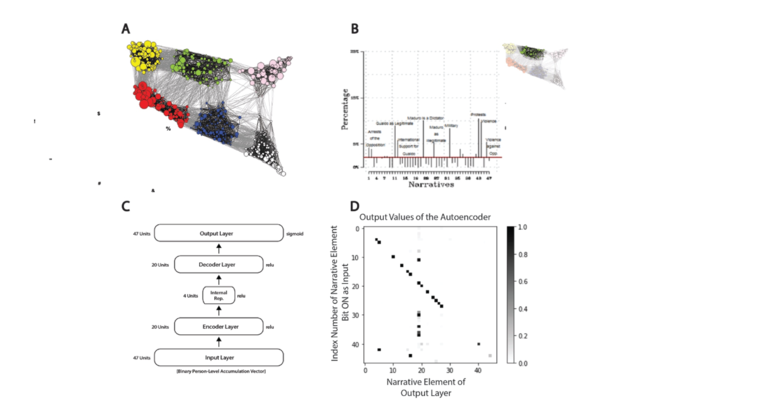The simulation of online information propagation at-scale provides a method for developing scientific understanding of several critical phenomena in sociology, psychology, economics, political science and other human-related systems. The integration across disciplines and modeling approaches, and across scales in some cases, has not yet matured into a set of standard methods nor has a set of example computational platforms become available for general use in government, academia or industry.
To tackle this problem we have developed an agent-based modeling platform for the implementation of a set of methods that provide
- development and testing of social, economic and psychological theory at-scale, and
- providing predictive (in time) forecasting of information propagation, and
- providing situational forecasting (what-if scenario simulation).
Key Findings:
Human social group behavior modeled as extended cognition makes sense.
Modeling agents with high-fidelity cognitive architectures is feasible at scale.
Development of a methodology for systematically integrating sociological, cognitive and economic functions into a nested functional Bayesian agent.
Development of a new semantic embedding method for social media platforms that is designed for interfacing with psychological models.
Development of a semantic clustering method.
Social psychological constructs implemented as simple computational agents can be used to predict future user belief production on social media.
Sociological constructs implemented in agent-based representation of social media system predicts the evolution of network structure.

Tools
Books Articles and Proceedings
Afrasiabi, M., Orr, M.G., and Austerweil, J.L.; “Evaluating Theories of Collaborative Cognition Using the Hawkes Process and a Large Naturalistic Data Set”; Paper presented at the Annual Meeting of the Cognitive Science Society; July 2019
Swarup, S.; “Adequacy: What Makes a Simulation Good Enough?”; Paper presented at the Spring Simulation Conference; May 2019
Orr, M.G.; “Multi-Scale Resolution of Human Social Systems: A Synergistic Paradigm for Simulating Minds and Society”; Social-Behavioral Modeling for Complex Systems; edited by Davis, P.K., O’Mahony, A., and Pfautz, J.; John Wiley & Sons, 2019, pp. 697-710.
Swarup, S., Marathe, A., Marathe, M.V., and Barrett, C.L.; “Simulation Analytics for Social and Behavioral Modeling”; Social-Behavioral Modeling for Complex Systems; edited by Davis, P.K., O’Mahony, A., and Pfautz, J.; John Wiley & Sons, 2019, pp. 617-632.
Orr, M.G., Lebiere, C., Stocco, A., Pirolli, P., Pires, B., and Kennedy, W.G.; “Multi-scale resolution of neural, cognitive and social systems”; Computational and Mathematical Organization Theory, 25 (2019): 4-23.
Orr, M.G., Lebiere, C., Stocco, A., Pirolli, P., Pires, B., and Kennedy, W.G.; “Multi-Scale Resolution of Cognitive Architectures: A Paradigm for Simulating Minds and Society”; Paper presented at the Association for the Advancement of Artificial Intelligence (AAAI) Fall Symposium; October 2018
Bhattacharya, P.; “The Matrix: An Agent-Based Modeling Framework for Complex Systems and Data Intensive Simulations”; Paper presented at the Dynamics On and Of Complex Networks Workshop (DOOCN-XI) at the Complex Systems Conference (Thessaloniki, Greece); September 2018
Orr, M.G., Lebiere, C., Stocco, A., Pirolli, P., Pires, B., and Kennedy, W.G.; “Multi-scale Resolution of Cognitive Architectures: A Paradigm for Simulating Minds and Society”; Social, Cultural, and Behavioral Modeling; edited by Thomson, R., Dancy, C., Hyder, A., and Bisgin, H.; Springer, 2018, pp. 3-15. [Presented at the International Conference on Social Computing, Behavioral-Cultural Modeling and Prediction and Behavior Representation in Modeling and Simulation (SBP-BRiMS); July 2018]
Conference Presentations
Bhattacharya, P., Ekanayake, S., Kuhlman, C.J., Lebiere, C., Morrison, D., Swarup, S., Wilson, M.L., and Orr, M.G.; “The Matrix: An Agent-Based Modeling Framework for Data Intensive Simulations”; Talk presented at the International Conference on Autonomous Agents and Multiagent Systems (AAMAS); May 2019
Orr, M.G.; Panel presentation on Miscellaneous Topics; Invited panel presentation for “Physics of Information Processing” at the 3rd International Workshop on Social Sensing (Orlando, Florida); April 2018
Awards
Best Paper for the International Conference on Social Computing, Behavioral-Cultural Modeling and Prediction and Behavior Representation in Modeling and Simulation (SBP-BRiMS) 2018
Lebiere, C.; “CMU researchers are building a model to predict human behavior. It could save lives one day.”; Interviewed by Linder, C.; Pittsburgh Post-Gazette; February 6, 2018







